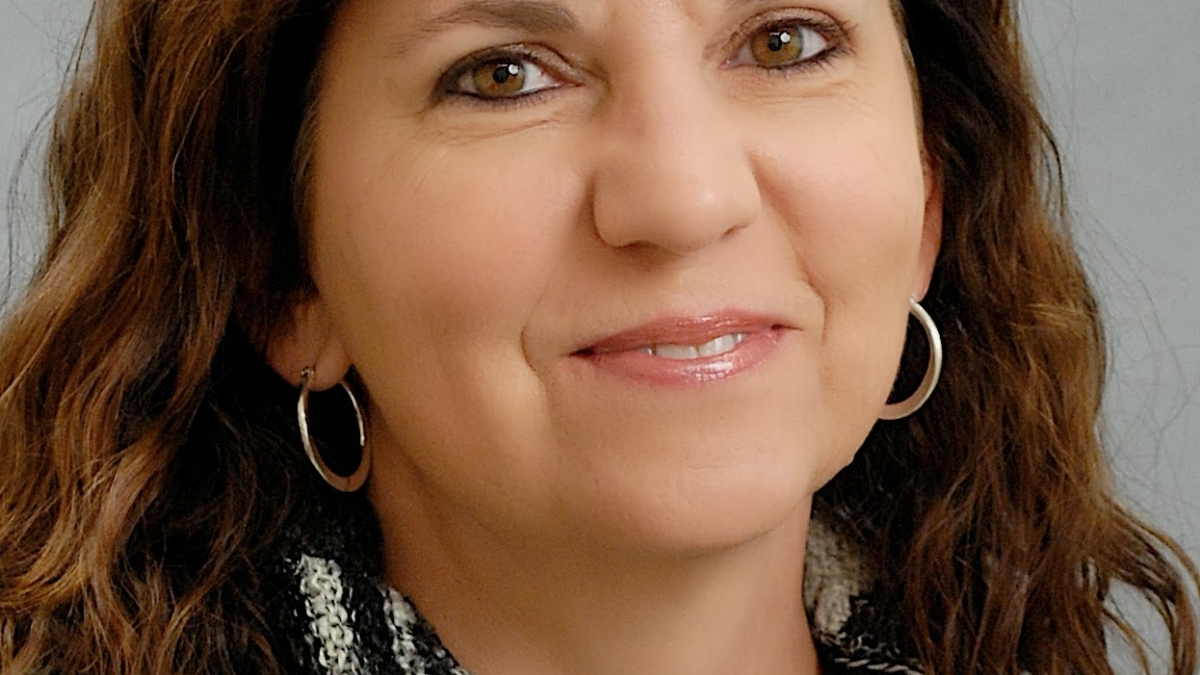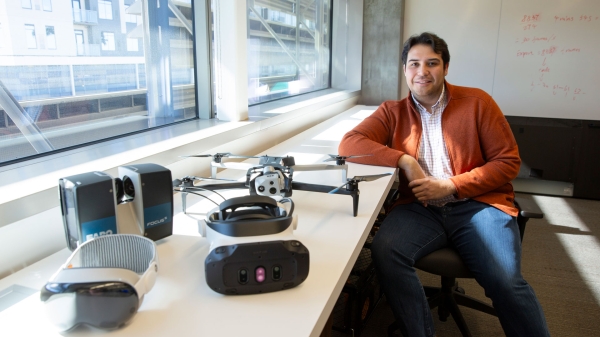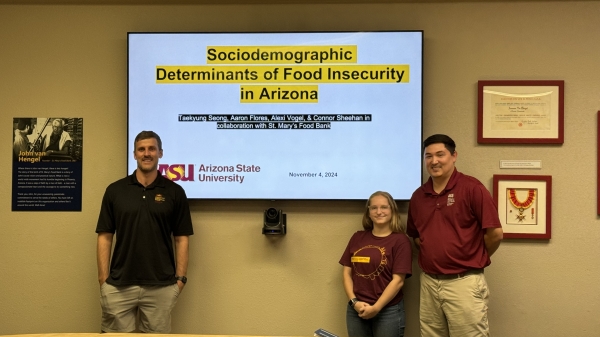Sharon Crook honored with Charles Wexler Teaching Award

Professor Sharon Crook is the recipient of the 2020 Charles Wexler Teaching Award.
Sharon Crook is the recipient of the 2020 Charles Wexler Teaching Award, the highest honor a faculty member can receive from the School of Mathematical and Statistical Sciences.
“I honestly am thrilled to receive this award,” Crook said. “Interacting with students, both in the classroom and as a research adviser and mentor, is what I enjoy most about my job. Receiving recognition for this work is extremely rewarding.”
Crook enjoys teaching mathematics and trying to come up with practical, real-life examples for how to use everything that she teaches.
“I also enjoy watching students slowly figure out how to develop and use mathematical models to answer questions,” she said.
Crook has been a faculty member at Arizona State University for 15 years, and holds a joint appointment with the School of Mathematical and Statistical Sciences and the School of Life Sciences.
In her research, she uses computational approaches to study the dynamics of neurons and networks of neurons, as well as the mechanisms underlying changes in these cells and networks due to trauma, learning or disease.
She also contributes to the development of NeuroML, an international effort to create a common standard for describing computational models for neuroscience research.
In the undergraduate mathematics program, Crook frequently teaches MAT 451: Mathematical Modeling, and MAT 355: Introduction to Computational Molecular Biology, a course which she developed. In fact, MAT 355 is one of the few courses which is cross-listed with other academic units, this one with the School of Life Sciences.
“I really enjoy teaching mathematical modeling. There is great diversity in the students who take it, and I enjoy interacting with them and teaching them how to do something creative that relies on many of the skills that they have learned in other courses,” she said.
Crook has a very active research program with many research publications that connect mathematics and biology. Through her ICON Lab (Informatics and Computation in Open Neuroscience Lab), Crook has served as research adviser for seven PhD students and four master's degree students to the completion of their degrees. She has also served on 19 PhD committees and six master's degree committees.
While she has an outstanding record of supervising graduate students, she always makes time for undergraduate research projects and directing honors theses. She has advised undergraduate research projects for 28 students total including 13 honors theses. In addition she has supervised honors contracts for research projects in her courses for 49 undergraduate students.
When asked if her ICON Lab is full, or still has room to accept new students to conduct research, her definitive response was "not full."
“I am always taking new students,” she said. “I talked to a new applied math undergrad yesterday who will probably join us in the fall.”
Crook teaches both biology and mathematics courses at the graduate and undergraduate levels, but her enthusiasm and passion for her undergraduate mathematics courses truly stand out. This is evidenced by the numerous positive comments from students about her undergraduate math courses, as well as statements by student nominations.
• “It is very clear Dr. Crook cares about her students. She presents sophisticated mathematical ideas simply and without pretension. I see her as a role model: a high achieving person but relatable. I would love to have more instructors like Dr. Crook.”
• “Professor Crook is an excellent teacher. She cares about every student, and she wants us to learn and succeed. She is also an outstanding mentor to undergraduate students doing research projects.”
• “This course was my favorite course at ASU by far. This class showed me more applications to real world work with mathematics than any of my other classes so far, and allowed me to gain more insight into topics that I truly care about. Amazing class!”
• “Dr. Crook always made herself available to assist students with coursework, regardless of time and location. I also like how she broke down each model we discussed into its most base form to help us understand how it was created.”
• (What did you like about the course?) “Literally everything. This is among my favorite courses in my four years here. The material is both powerful in its abstraction and incredibly practical. Dr. Crook is passionate and makes the material approachable.”
Crook was born in California but grew up in Hattiesburg, Mississippi, where her father worked at the University of Southern Mississippi as a professor of theater.
She always loved math in school starting as early as she can remember. In high school she really enjoyed her AP calculus class.
“When it came time to choose a major, I was trying to choose between mathematics and journalism, and somehow mathematics won,” Crook said. “I think because I was also interested in computer science, and math and computer science seemed like a good combination.”
As planned, she earned her bachelor’s degree in mathematics with a minor in computer science from the University of Southern Mississippi.
With a keen interested in biology, she did a summer research program at the Medical University of South Carolina while an undergraduate. She was also heavily involved with undergraduate research during the school year.
“These activities led me to graduate school at an institution with mathematical biology faculty. After taking a class in mathematical neuroscience, I was hooked!” Crook said.
Crook earned her master’s degree and PhD in applied mathematics at the University of Maryland in College Park. She worked as a postdoctoral researcher at Montana State University, and as an assistant professor at the University of Maine, before joining ASU in 2004 as an assistant professor. In 2010 she was promoted to associate professor, and in 2017 to full professor.
Crook came to ASU for the opportunity for a joint position that was advertised across the School of Mathematical and Statistical Sciences and the School of Life Sciences.
“This was perfect for me because I was incredibly interested in teaching courses at that interface between mathematics and biology,” said Crook. “It was a great fit, and luckily, the search committee recognized that.”
Several students who nominated Crook for the teaching award also saw her as a role model for women in math.
“Not only is Professor Crook a successful scientist, teacher and mentor, but also she has done it all while growing a family," one student said. "As a woman pursuing math, it was terrifying thinking of how I could possibly achieve my two biggest goals in life: to have a successful career using my math and logic skills and to have a family with children. Through my undergraduate career, I was encouraged and motivated by her example and she proves how powerful women are and that I don’t have to choose between a career and a family — I can have both.”
“I think anyone who is part of a minority group is going to be looked at as a role model at some point,” Crook said. “But I try to live up to that aspect of my career and really be there for others as a resource of information and honesty.
“I did not have any female instructors in mathematics during my entire undergraduate and graduate training — not even one.
“It was not an easy path, and I have lots of stories to tell. But, there were a few supportive male faculty who had a huge impact on my training and progress through my career. Also, I can be a bit stubborn.”
Crook contends having a career and family is a constant struggle.
“I have found that even though sometimes others make it look easy, if you talk to them, you will find it is not easy for anyone. But for me it has been worth it, of course, and I keep trying to do my best,” she said.
Crook actively attends meetings of the Association for Women in Mathematics (AWM) student chapter and recommends it as a great resource for students.
“Not only is important information shared through the AWM chapter activities, there are many important networking opportunities,” Crook said. “But, just having a place to get to know faculty, staff and other students outside of the classroom is an important aspect of the student chapter.”
The Charles Wexler Teaching Award was established in 1977, in memory of Professor Charles Wexler, with a gift from his wife, Helen, to honor his accomplishments in the field of mathematics and his contributions to the School of Mathematical and Statistical Sciences. Wexler was the founding chairman of the Department of Mathematics at Arizona State University. At the time of his retirement, he had accumulated 47 years of service, the longest period of faculty service in the university’s history. In 1977, the A-Wing of the Physical Sciences Center was named after Wexler in appreciation of his outstanding service to the university from 1930 until 1977.
Due to the COVID-19 pandemic, the 43rd annual Charles Wexler Awards ceremony was changed to a smaller online format. Jonathan Wexler, son of Charles Wexler, was able to join from Sunnyvale, California, via Zoom.
“Sharon is an outstanding professor," said Al Boggess, professor and director of the School of Mathematical and Statistical Sciences. "Her keen enthusiasm in the biological applications of math comes through and excites her students. She has one of the best records in our school for mentoring students in research projects. She encompasses every aspect of what the Wexler Teaching Prize embraces.”
We asked Crook a few more questions about life at ASU.
Question: What is something you learned while at ASU — in the classroom or otherwise — that surprised you, that changed your perspective?
Answer: I grew up in an environment that embraced diversity. In spite of that background and coming to my career with a relatively open mind, interacting with students and faculty from many different backgrounds has made me even more empathetic to the views and situations of others.
Q: What do you like about being part of the faculty in the School of Mathematical and Statistical Sciences, and ASU?
A: I could probably be happy just about anywhere since I am a "make the best of it" type of optimist. But I love that there is always something really novel and innovative going on at ASU. It's great coming to work at a place with incredibly talented, enthusiastic teachers and researchers. Also, I value the strong collegiality and support that (the school) provides.
Q: What advice would you give to university students thinking of possibly majoring in mathematics?
A: A major in mathematics can open the door to so many different pathways. It provides flexibility and a solid foundation for a lifetime of learning new things. So many of my students have found rewarding career paths, so I think mathematics continues to be a great choice for major.
Q: What do you think is the most misunderstood thing about math by the general public?
A: I think many people don't understand that mathematics provides a foundation for so many different careers.
Q: What is your favorite spot on campus, and why?
A: I appreciate the many, terrific outdoor spots at ASU and great winter weather. Taking a stroll around campus is always enjoyable. But my favorite spot is my office because it is the place where I can concentrate and sink deeply into my research best.
Q: What do you like to do in your spare time for fun?
A: I enjoy sports and outdoor activities like cycling, hiking and playing ultimate Frisbee. I also enjoy reading, gardening, listening to music and spending time with friends and family.
Q: If someone gave you $40 million to solve one problem on our planet, what would you tackle?
A: We face many large problems that are important, but without a doubt I would spend the money on trying to help stop climate change. Humans are terrible at recognizing life-threatening problems that will start next week or next month, so a problem that seems years away will always seem less dire. That's why it would be so important to put in the research and resources to work on it now.
More Science and technology

Teaching construction realities with virtual environments
Visiting a construction site is a valuable learning opportunity for students who want to one day work in the industry.…
ASU, Mexico partner to build next generation of chipmakers, drive semiconductor innovation
Thousands of college students in Mexico will soon have the opportunity to enroll in Arizona State University’s new, free online…

ASU, St. Mary’s Food Bank partner to tackle food insecurity in Arizona
Arizona State University and St. Mary’s Food Bank (SMFB) have joined forces to create an interactive data dashboard that tracks…